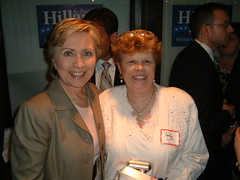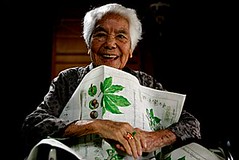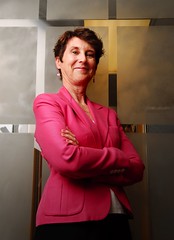Are You Going to Stop Working?

Last night Kathy Adams, who leads Arlington Place of Oelwein, Iowa, an Ecumen-managed community, was elected to the school board in Oelwein. (Word is that Hillary wanted to meet a person in the heartland who represents America’s changing face of retirement.) Kathy is planning on retiring soon, but let’s get real, anyone who has met her knows she’s not really going to retire, she’s going to keep using her skills in building community. That school board job is going to be a lot of work. Kathy won’t be alone. Many others are joining her in redefining retirement.Today Dave Phelps had an interesting front-page article in the Minneapolis Star Tribune: 'Retirement Age Doesn’t Mean 65.' According to his article, U.S. Census data shows: - 23.2% of U.S. residents 65 to 74 are working. - In Minnesota, that percentage is higher, 26.3 percent. -Of Twin Cities residents in their late 60s and early 70s, more than one in four, or 27.4% are working. -Among the top 20 largest metros in the U.S., only Washington D.C., Boston, and Dallas-Fort Worth are higher.A lot of boomers don’t plan on retiring. We learned that in our Age Wave Study. Many of them also say they’re going to change jobs and do work that they enjoy. This is going to change the face of the workplace significantly, including different benefit structures, flexible scheduling, more entrepreneurial efforts and a whole host of other areas.How do you view retirement? Are you going to have a traditional retirement and stop working, or will you continue working/do some work?
What’s Up With This?
Not sure why nearly a 1/2 page in the morning newspaper was devoted to Britney Spears today , but check out this first paragraph from the Associated Press, especially the second sentence.As in most train wrecks, it was hard to focus on just one thing as the Britney Spears disaster unfolded on MTV’s Video Music Awards. There was just so much that went wrong … . Lethargic movements that seemed choreographed by a dance instructor for a nursing home… . At times, she just stopped singing, as if even she knew nothing could save her performance. It’s like the congressional ad last year in Minnesota that featured a young person dressed up in a grey wig, sitting on a parking bench, acting all meek and confused - generalizing that old people' are ah, meek and confused. Or the high-speed internet ad that’s running nationally that shows the 'before' and 'after' with high-speed internet service. The 'before' is a photo of a senior woman, the 'after' is a young beauty queen. You get the message …Ageist advertising and media depictions that fuel stereotypes need to go, go, go away. Aging is about living, even at the end of life. If you see ageism at work in the media, please submit it here. We can share it and hopefully help get it extinguished.
A Question for you …
Let’s pretend for a second that you have two things:1. Nothing holding you back from your visions (no rules, all the money in the world, no one to say no, absolutely nothing but wide open opportunity).2. A magic wand.What change or changes would you make to long-term care or aging services?Please answer by clicking below on comment' (you get to be an inventor and adventurer here, be whoever you want to be, yourself, Thomas Edison, Amelia Erhart, Richard Branson, anyone … this is pretend time).
A Question For You?
Do You Use the F Word?
FACILITY. I’ve used it a lot, but today I’m eliminating it from my vocabulary. Who wants to live in a facility? Guess what, honey, I’m moving to the FACILITY.' Yippeeee.Language triggers visions in the mind. Would you rather go to the ballpark or the stadium? Ballpark connotes smaller, open air, blue skies, maybe ivy on the walls. When I hear stadium I think of a concrete mass in the middle of a sea of parking lots. There’s a reason Major League Baseball doesn’t use the word 'stadium' anymore or why the American Association of Intellectual and Developmental Disabilities changed its name from the American Association on Mental Retardation, or some people use the phrase 'rightsize' instead of 'downsize' …In our Age Wave study, we asked baby boomers about several words in our profession. They can’t stand facility. And they don’t like campus. They really don’t like 'nursing home.' The word they embraced? Community. Makes total sense. Community vs. facility. One is much warmer, more inclusive, more vibrant, and people have lived in communities all of their life. Here’s an interesting perspective on language from Elite Care, a senior housing company in Oregon:We adopt a new vocabulary to erase debilitating stereotypes. Think about typically used elder care terms such as 'assisted,' 'caregiver,' 'administrator,' 'aide,' 'nurse,' and 'facility.' These words imply sickness, disability, and mindsets that inhibit creation of healthy power structures. Then consider words like 'facilitate,' 'elder,' 'extended family,' 'Life Enhancing Tasks,'„¢ and Neighborhood Coordinator. This new vocabulary does not make elders 'objects of care,' or make staff overprotect residents, because of stereotypes bolstered by language.Here’s another look at language from Paul Kleyman, editor of Aging Today, and a survey he directed at the American Society on Aging:In the June 2007 ASA Connection, readers answering our “Quick Question” about terms for people ages 65-plus overwhelmingly favored older adults, with elders running second. Now, thanks to a new study from the Journalists Exchange on Aging, we have a chance to see how reporters and editors view the issue -- and it turns out that both terms also made the journalists’ preferred list. By contrast, senior citizen found little favor in either camp: The JEOA study dismisses the label as “euphemistically sour,” and only 10.8 percent of the “Quick Question” respondents found it acceptable. Interestingly, in the survey we did of Minnesota baby boomers, 'senior' was preferred by 48% of respondents, 40% preferred 'older adult' and only 9% liked 'elder' the best. What is abundantly clear, however, is that there is a huge opportunity to change the language of aging services. What are words that you’d like to see changed?
50, 60, 70, 80, 90, 100, 110, … Models Wanted
AARP The Magazine is looking for the Faces of 50+€”real men and women (no professionals, please!) who look and feel great at 50 and beyond. Selected models may appear in fashion and beauty articles in AARP The Magazine throughout 2008. It’s free and easy to nominate someone or yourself online. The deadline is October 15th.
50, 60, 70, 80, 90, 100, 110... Models Wanted
AARP The Magazine is looking for the Faces of 50+€”real men and women (no professionals, please!) who look and feel great at 50 and beyond. Selected models may appear in fashion and beauty articles in AARP The Magazine throughout 2008. It’s free and easy to nominate someone or yourself online. The deadline is October 15th.
Secrets in Successful Aging From Around the Globe

National Geographic Magazine about two years ago traveled the world and looked at several communities and their secrets for longevity. You can watch a video clip from their travels here. Here are a few interesting things they learned about successful aging:From Sardinia in Italy, where men reach 100 at a rate more than twice as high as the average for Italy, they took these tips:- Drink red wine (in moderation)- Share the work burden with spouse- Eat pecorino cheese (and other omega-3 foods)From Seventh-day Adventists in California who live four to 10 years longer than the state’s average, they took away these tips for longevity:- Eat nuts and beans- Observe the Sabbath- Have faithIn Japan, Okinawans' average life expectancy of 82 years is among the longest in the world. Tips from Japan:- Keep lifelong friends- Eat small portions- Find purposeThings they learned that were common to all three communities were:- Don’t smoke- Put family first- Be active every day- Keep socially engaged- Eat fruits, vegetables and whole grainsAging … it is all about living. Have a great Labor Day Weekend. See you next week.
A Health Club For the Mind
That’s what the Osher Lifelong Learning Institute at the University of Minnesota is. It’s a membership group of older adults who love learning. The only precertifications you have to bring to class are: experience and curiosity. Classes for the next 8-week session begin September 24th. Go here for a course catalog. Members pay $195 annually for access to classes, which are held during the day. They have more than 180 classes featuring a variety of interesting topics, including: The Geology of the Gunflint Trail, The Art of Bob Dylan; U.S. Presidents: Myths and Realities; and An Elder’s Advantage.
Lakeshore’s Fall Semester StartingLearning is so important to successful aging. Lakeshore in Duluth under the leadership of Chaplain Alice Olson is starting its fall lifelong learning series on September 17th. Courses, which begin on September 17th, will be taught by Duluth-area experts, including several from Lakeshore. Topics will include Your Role in Saving the Environment to Preserving One’s Ears (and hearing) for Years to The Kinesthetic and Creative Power of Drawing to An Insider’s Guide to Norway. For readers in Duluth, contact Chaplain Alice Olson (aliceolson@ecumen.org) for more information.
Lessons in Leadership From Elmer Andersen
Elmer Andersen, the former Governor of Minnesota, entrepreneur, writer, and philanthropist, was a model for successful aging. He died in 2004. This month’s Twin Cities Business Magazine features Ecumen CEO and president Kathryn Roberts discussing the impact that Governor Andersen had on her leadership style. Below is the article: 'I met Elmer Andersen in the early 80s, when I was running the management analysis  division of the Minnesota Department of Administration. I was asked to lead the staff support for a task force that was to make recommendations to the governor and the legislature on how post-secondary education should be organized in the future. Former Governor Elmer Andersen was chair of that group.'I was 20-something. I walked into the first meeting and everyone had gray hair; the average age was probably mid-70s. I thought, 'How the heck is this going to work? This group is supposed to develop new ideas.' But it was the most provocative, insightful, dare-to-be-different kind of conversation I had ever participated in - and it was all fueled by Elmer.'I was wowed by his charm, his intellect, and his vision, which were apparent the moment you walked into his circle of light. Elmer had a sage leadership, a professional courtesy for everybody. He gave people permission to talk, to generate ideas, and to give their opinions. He had this quiet, thoughtful presence that exuded leadership.'I learned a lot about leadership of groups from him and how to synthesize that into a product. In addition to being a leader who brought people with disparate thoughts together -- which I try to model -- Elmer was a man of high integrity. I got from him an understanding of what a public servant was. For Elmer, it really was a higher calling.'Who has impacted your leadership style? How?
division of the Minnesota Department of Administration. I was asked to lead the staff support for a task force that was to make recommendations to the governor and the legislature on how post-secondary education should be organized in the future. Former Governor Elmer Andersen was chair of that group.'I was 20-something. I walked into the first meeting and everyone had gray hair; the average age was probably mid-70s. I thought, 'How the heck is this going to work? This group is supposed to develop new ideas.' But it was the most provocative, insightful, dare-to-be-different kind of conversation I had ever participated in - and it was all fueled by Elmer.'I was wowed by his charm, his intellect, and his vision, which were apparent the moment you walked into his circle of light. Elmer had a sage leadership, a professional courtesy for everybody. He gave people permission to talk, to generate ideas, and to give their opinions. He had this quiet, thoughtful presence that exuded leadership.'I learned a lot about leadership of groups from him and how to synthesize that into a product. In addition to being a leader who brought people with disparate thoughts together -- which I try to model -- Elmer was a man of high integrity. I got from him an understanding of what a public servant was. For Elmer, it really was a higher calling.'Who has impacted your leadership style? How?

